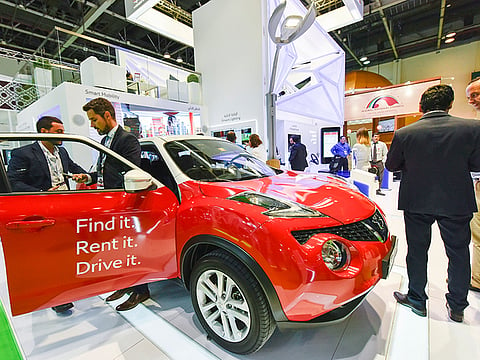LED smart lighting for Dubai Canal bridges
The lighting units have a remote control and monitoring system that reduces the cost of operations and maintenance

Dubai: More than 200 environmentally friendly smart LED lighting units have been installed on the Dubai Canal bridges, with more planned in Dubai in the future, RTA said on Sunday.
Salem Al Rimawi, Roads, Lighting and Traffic Signal manager, said the smart LED lighting posts save at least 50 per cent more energy than normal lamp posts, and reduce carbon dioxide emissions.
“The lighting units have a remote control and monitoring system that reduces the cost of operations and maintenance,” Al Rimawi said at Gitex Technology Week, explaining that each unit sends data wirelessly to the control room, so there is no need to send teams to physically inspect the units, thereby reducing maintenance costs.
“When there is an issue the system will alert us. We will send someone, but there is no need for routine visits,” he said.
The units also allow the RTA to control the intensity of the light remotely if needed, which also helps in conserving energy.
The units will be rolled out across Dubai over time with the aim of changing all the light poles in Dubai to the smart LED lighting units by 2030 as to reduce the carbon footprint by more than 3,000 tonnes per year.
The units, Al Rimawi said, also have various features that can be added on, depending on the needs of the area, “We can add a WiFi hotspot and cameras to count the people in the area.”
RTA has also changed more than 5,000 normal lamps to LED lamps.
Abdullah Al Bastaki, director of Technology, Strategy and Governance at RTA, highlighted the success of the Al Raqeeb system, which had been tried out for around eight months on 50 buses.
“The system has helped reduce distractions by 88 per cent,” he said.
The system has a camera-like device fitted in front of the bus driver to monitor his facial expressions and detect any indicators of fatigue, tiredness or distraction the driver experiences. The indicators are transmitted to the Control Room at RTA where the case will be responded to immediately.
If the system detects that the driver is distracted or not looking at the road, the device will alert the driver by producing a sound and vibrating the chair.
“Starting 2017, we have a plan to start rolling out the devices to cover 35 per cent of buses,” he said, noting that RTA has 1,500 buses.
Finally, RTA will be implementing phase one of the smart parking system on Shaikh Zayed Road and Al Riqqa.
“Sensors fitted in the parking spots will allow users to know the number of free parking space either through the RTA app or by looking at the smart parking screens that will be fitted in each area,” Al Bastaki said.
The phase is expected to be completed by the first quarter of 2017. “We plan to have this implemented across all of Dubai. The places where it will be implemented will be chosen depending on the priority and requirements, with priority being given to popular areas,” he said.



